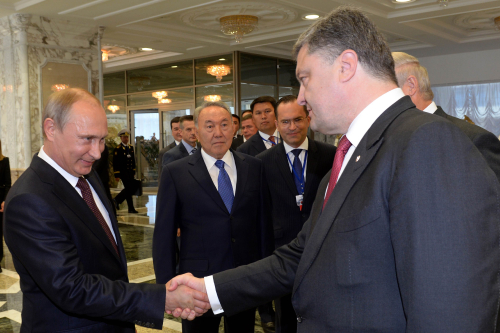|

|
|
CRISIS MANAGEMENT: Russian President Vladimir Putin and Ukrainian President Petro Poroshenko shake hands before holding talks in Minsk, capital of Belarus, on August 26 (XINHUA/AFP) |

The protracted Ukraine crisis has not only tested big power relations, resulting in a new cold war between Russia and the West, but has also taken a toll on the world economy. Regardless of which side temporarily prevails in the confrontation, there are seemingly no winners in economic terms.
The biggest losers
Since Ukraine became independent from the Soviet Union in 1991, the country has begun the transition to a market economy. However, the process was not a success. For more than 20 years, the Ukrainian economy has never enjoyed long-term rapid growth. Statistics from the World Bank show that in 1990, Ukraine's gross domestic product (GDP) was $81.5 billion while that of Poland-—another Eastern European country that began a similar transitional process around the same time-—was just $64.5 billion. But by 2013, the GDP of Ukraine totaled a relatively weak $177.4 billion while that of Poland grew to $517.5 billion.
In a sense, the outbreak of the political crisis last November further worsened the already grave economic situation in Ukraine.
Due to the political chaos, Ukraine's currency continues to depreciate, and some banks in the country have lost their capacity to pay. To address capital flight, the Ukrainian Government has staged a series of capital controls including restricting foreign remittance and public withdrawal of foreign currency at banks. However, these measures also discourage investors. Correspondingly, sagged investment activities further impact economic growth, dragging the Ukrainian economy into a vicious cycle.
In addition, the months-long armed conflict between government troops and pro-independence militants in east Ukraine has severely affected the domestic market supply, resulting in soaring prices of almost all commodities. With natural gas supplies from Russia cut off in June, inflation pressures in Ukraine elevated further.
Ukraine is one of the world's largest exporters of wheat and corn, but its domestic crisis has had an adverse impact on agricultural production. Meanwhile, many farmers have held back grain to protect themselves against the country's falling currency. Reduced exports from Ukraine will inevitably push up international grain prices and eventually lead to higher food prices worldwide-—especially in some developing countries.
The costs of losing control of the Crimean Peninsula for the Ukrainian economy cannot be underrated either. It is estimated that Ukraine could lose $40-billion worth of shale gas resources along the coast of the Black Sea.
If the crisis continues, Ukraine's economy is likely to worsen. Some international credit rating agencies have downgraded Ukraine's credit rating. The Ukrainian Government has also lowered the country's major macroeconomic indicators, predicting that the country's GDP in 2014 would shrink 3 percent year on year. The International Monetary Fund even estimated that Ukraine's GDP in 2014 may decrease by as much as 5 percent.
In addition, by June 2014, Ukraine's foreign debt stood at $136.8 billion, or 81.8 percent of its GDP. The risk of a national debt default is also on the rise.
Suffering from sanctions
Russia was undoubtedly one of Ukraine's most important trading and economic partners before the crisis, which has now taken a toll on interrupted bilateral economic relations. However, Ukraine relies much more heavily on Russia than vice versa. Thus, the current standoff has done little harm to the Russian economy.
| 